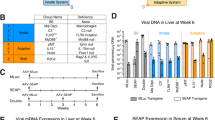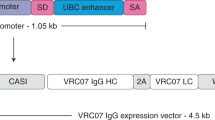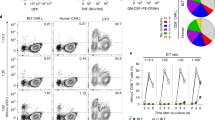Abstract
Immunogenicity of recombinant adenoviral (Ad) vectors severely hampers the clinical development of gene therapy protocols using repeated vector administrations. Inhibition of costimulation by APCs was explored as a strategy to circumvent the immune response against Ad particles. This strategy was tested in rhesus monkeys, treated transiently with chimeric anti-human CD40 and anti-human CD86 antagonist monoclonal antibodies (MAbs) at the time of systemic administration of a recombinant Ad vector. After Ad vector administration in the absence of immunosuppressive treatment, transgene expression in the serum lasted about 3–4 weeks. All control animals developed a strong neutralizing antibody (NAb) response to the Ad particles, which totally prevented efficient administration of a second vector, as shown by the lack of transgene expression. Treatment with anti-CD40 and anti-CD86 chimeric MAbs delayed or blocked the development of a humoral response against Ad and the infiltration of CD8+ lymphocytes into the liver. This resulted in (i) increased persistence of Ad-transduced cells after injection of a first vector encoding a nonimmunogenic transgene, and (ii) the possibility of readministering a second Ad vector with significant efficacy. In both respects, the combined blockade of CD40 and CD86 was more efficient than treatment with anti-CD40 alone. This study shows for the first time in non-human primates that blocking CD40 and CD86 costimulatory molecules represents a promising strategy to inhibit immune responses against an Ad vector injected systemically.
This is a preview of subscription content, access via your institution
Access options
Subscribe to this journal
Receive 12 print issues and online access
$259.00 per year
only $21.58 per issue
Buy this article
- Purchase on Springer Link
- Instant access to full article PDF
Prices may be subject to local taxes which are calculated during checkout







Similar content being viewed by others
References
Wilson JM . Molecular medicine: adenoviruses as gene delivery vehicles. Mol Med 1996; 334: 1185–1187.
Kaplan JM et al. Humoral and cellular immune responses of nonhuman primates to long-term repeated exposure to Ad2/CFTR-2. Gene Therapy 1996; 3: 117–127.
Christ M et al. Gene therapy with recombinant adenovirus vectors: evaluation of the host immune response. Immunol Lett 1997; 57: 19–25.
Sullivan DE et al. Liver-directed gene transfer in non-human primates. Hum Gene Ther 1997; 8: 1195–1206.
Schnell MA et al. Activation of innate immunity in nonhuman primates following intraportal administration of adenoviral vector. Mol Ther 2001; 3: 708–722.
Lozier JN, Metzger ME, Donahue RE, Morgan RA . Adenovirus-mediated expression of human coagulation factor IX in the rhesus macaque is associated with dose-limiting toxicity. Blood 1999; 94: 3968–3975.
Nunes FA, Furth EE, Wilson JM, Raper SE . Gene transfer into the liver of nonhuman primates with E1-deleted recombinant adenoviral vectors: safety of readministration. Hum Gene Ther 1999; 10: 2515–2526.
Yang Y, Ertl HCJ, Wilson JM . MHC class I-restricted cytotoxic T lymphocytes to viral antigens destroy hepatocytes in mice infected with E1-deleted recombinant adenoviruses. Immunity 1994; 1: 433–442.
Juillard V et al. Long-term humoral and cellular immunity induced by a single immunization with replication-defective adenovirus recombinant vector. Eur J Virol 1995; 25: 3467–3473.
Yang Y, Lin Q, Ertl HCJ, Wilson JM . Cellular and humoral immune responses to viral antigens create barriers to lung-directed gene therapy with recombinant adenoviruses. J Virol 1995; 69: 2004–2015.
Yang Y et al. Immune responses to viral antigens versus transgene product in the elimination of recombinant adenovirus-infected hepatocytes in vivo. Gene Therapy 1996; 3: 137–144.
Michou A-I et al. Adenovirus-mediated gene transfer: influence of transgene, mouse strain and type of immune response on persistence of transgene expression. Gene Therapy 1997; 4: 473–482.
Tripathy SK, Black HB, Goldwasser E, Leiden JM . Immune responses to transgene-encoded proteins limit the stability of gene expression after injection of replication-defective adenovirus vectors. Nat Med 1996; 2: 545–550.
Shean MK et al. Immunomodulation and adenoviral gene transfer to the lungs of nonhuman primates. Hum Gene Ther 2000; 11: 1047–1055.
Kafri T et al. Cellular immune response to adenoviral vector-infected cells does not require de novo viral gene expression: implications for gene therapy. Proc Natl Acad Sci USA 1998; 95: 11377–11382.
Lenschow DJ, Walunas TL, Bluestone JA . CD28/B7 system of T cell costimulation. Annu Rev Immunol 1996; 14: 233–258.
Grewal IS, Flavell RA . CD40 and CD154 in cell-mediated immunity. Annu Rev Immunol 1998; 16: 111–135.
Kay MA et al. Long-term hepatic adenovirus-mediated gene expression in mice following CTLA4Ig administration. Nat Genet 1995; 11: 191–197.
Yang Y et al. Transient subversion of CD40 ligand function diminishes immune response to adenovirus vectors in mouse liver and lung tissues. J Virol 1996; 70: 6370–6377.
Scaria A et al. Antibody to CD40L inhibits both humoral and cellular immune responses to adenoviral vectors and facilitates repeated administration to mouse airways. Gene Therapy 1997; 4: 611–617.
Chirmule N et al. Readministration of adenovirus vector in nonhuman primate lungs by blockade of CD40–CD40 ligand interactions. J Virol 2000; 74: 3345–3352.
Kay MA et al. Transient immunomodulation with anti-CD40 ligand antibody and CTLA4Ig enhances persistence and secondary adenovirus-mediated gene transfer into mouse liver. Proc Natl Acad Sci USA 1997; 94: 4686–4691.
Ziller C, Stoeckel F, Boon L, Haegel-Kronenberger H . Transient blocking of both B7.1 (CD80) and B7.2 (CD86) in addition to CD40–CD40L interaction fully abrogates the immune response following systemic injection of adenovirus vector. Gene Therapy 2002; 9: 537–546.
Boon L et al. Prevention of experimental autoimmune encephalomyelitis in the common marmoset (Callithrix jacchus) using a chimeric antagonist monoclonal antibody against human CD40 is associated with altered B cell responses. J Immunol 2001; 167: 2942–2949.
Laman JD et al. Protection of marmoset monkeys against EAE by treatment with a murine antibody blocking CD40 (mu5D12). Eur J Immunol 2002; 32: 2218–2228.
Boon L et al. Preclinical assessment of anti-CD40 Mab 5D12 in cynomolgus monkeys. Toxicology 2002; 174: 53–65.
Haanstra KG et al. Prevention of kidney allograft rejection using anti-CD40 and anti-CD86 in primates. Transplantation 2003; 75: 637–643.
Schreiber RD, Farrar MA . The biology and biochemistry of interferon-gamma and its receptor. Gastroenterol Jpn 1993; 28 (Suppl): 4–88.
Zoltick PW et al. Biology of E1-deleted adenovirus vector in nonhuman primate muscle. J Virol 2001; 75: 5222–5229.
Chirmule N et al. Repeated administration of adenoviral vectors in lungs of human CD4 transgenic mice treated with a non-depleting CD4 antibody. J Immunol 1999; 163: 448–455.
Van Gool SW et al. Blocking CD40–CD154 and CD80/CD86–CD28 interactions during primary allogeneic stimulation results in T cell anergy and high IL-10 production. Eur J Immunol 1999; 29: 2367–2375.
Koenen HJPM, Joosten I . Blockade of CD86 and CD40 induces alloantigen-specific immunoregulatory T cells that remain anergic even after reversal of hyporesponsiveness. Blood 2000; 95: 3153–3161.
Chartier C et al. Efficient generation of recombinant adenovirus vectors by homologous recombination in E. coli. J Virol 1996; 70: 4805–4810.
Lusky M et al. In vitro and in vivo biology of recombinant adenovirus vectors with E1, E1/E2A, or E1/E4 deleted. J Virol 1998; 72: 2022–2032.
Mittereder N, March KL, Trapnell BC . Evaluation of the concentration and bioactivity of adenovectors for gene therapy. J Virol 1996; 70: 7498–7509.
Acknowledgements
We thank Marielle Christ for her role at the initiation of this project, and Bruce Acres for critical reading of the manuscript.
Author information
Authors and Affiliations
Additional information
This study was supported by research funding from the European Community (EUREKA project Σ!1925GISTCO)
Rights and permissions
About this article
Cite this article
Haegel-Kronenberger, H., Haanstra, K., Ziller-Remy, C. et al. Inhibition of costimulation allows for repeated systemic administration of adenoviral vector in rhesus monkeys. Gene Ther 11, 241–252 (2004). https://doi.org/10.1038/sj.gt.3302152
Received:
Accepted:
Published:
Issue Date:
DOI: https://doi.org/10.1038/sj.gt.3302152
Keywords
This article is cited by
-
Helper-dependent adenovirus achieve more efficient and persistent liver transgene expression in non-human primates under immunosuppression
Gene Therapy (2015)
-
Successful attenuation of humoral immunity to viral capsid and transgenic protein following AAV-mediated gene transfer with a non-depleting CD4 antibody and cyclosporine
Gene Therapy (2012)
-
Adenoviral vectors: Adenoviral vectors, breaking a barrier to gene therapy?
Gene Therapy (2004)



